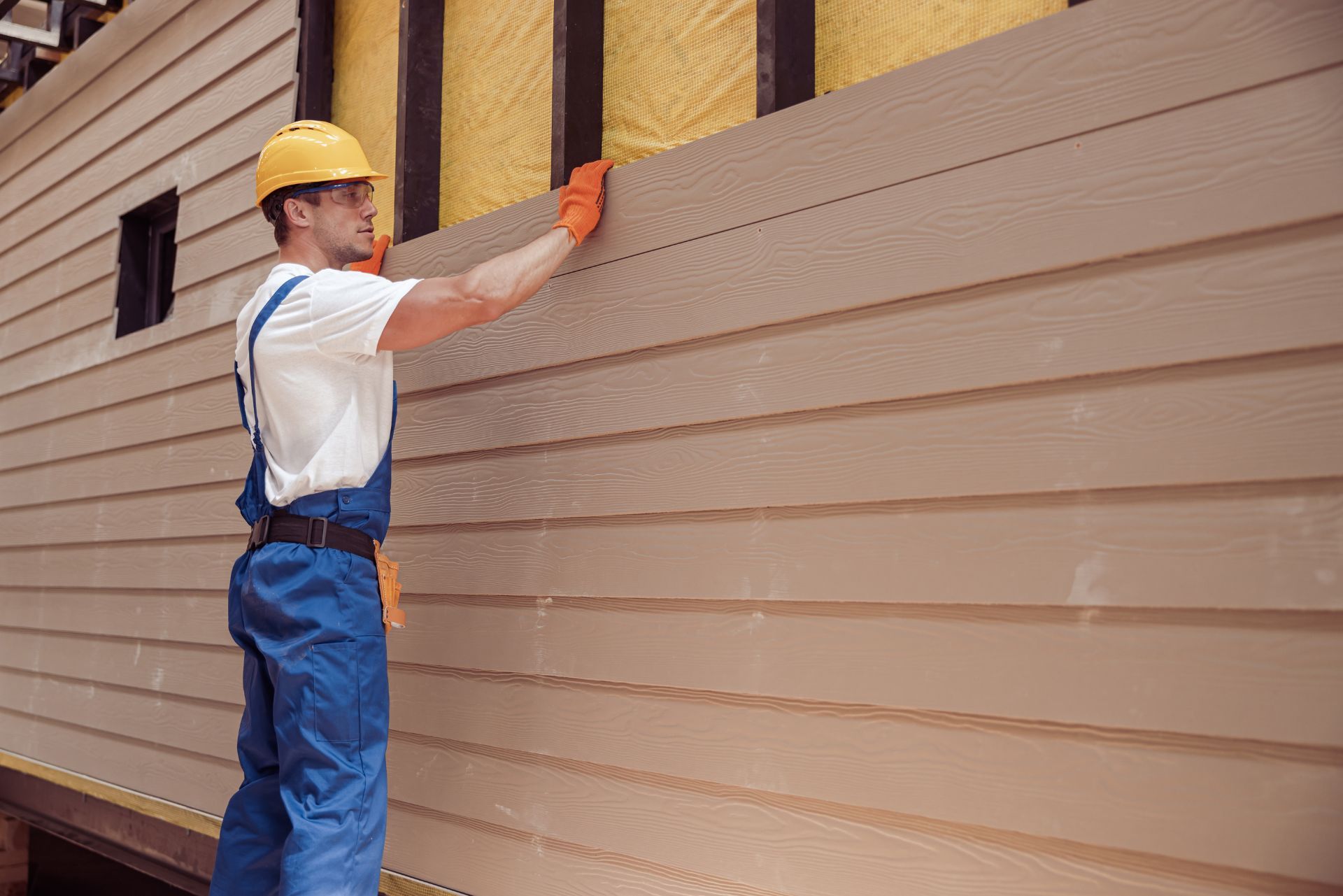Arizona Siding Contractor Insurance
See How We're Different:
or Call Us:(480) 526-3222

Most Common Business Policies
Index
Contact Us
When it comes to running a siding contracting business in Arizona, understanding the nuances of insurance is crucial. This guide aims to provide comprehensive insights into the types of insurance that siding contractors should consider, the legal requirements in Arizona, and tips for finding the right coverage.
Understanding the Importance of Insurance for Siding Contractors
Insurance serves as a safety net for businesses, protecting them from unforeseen circumstances that could lead to financial loss. For siding contractors, the risks can be significant, ranging from property damage to employee injuries. Having the right insurance not only safeguards the business but also enhances its credibility. In a competitive market, being able to demonstrate robust insurance coverage can be a deciding factor for potential clients, who often seek assurance that their investment is secure.
Moreover, insurance can also play a pivotal role in compliance with local regulations and industry standards. Many areas require contractors to carry specific types of insurance to operate legally, and failing to meet these requirements can result in hefty fines or even the suspension of business operations. Therefore, understanding the nuances of insurance not only protects the contractor but also ensures that they remain compliant with the law, allowing them to focus on their work without the looming threat of legal repercussions.
Types of Risks Faced by Siding Contractors
Siding contractors encounter various risks on the job, including accidents, equipment damage, and property damage. These risks can arise from factors such as weather conditions, the use of heavy machinery, and the nature of the materials being handled. For instance, working at heights poses a significant risk of falls, which can lead to serious injuries. Additionally, the handling of sharp tools and heavy panels can result in accidents that not only injure workers but can also damage property, leading to costly repairs and potential lawsuits. Understanding these risks is the first step in determining the appropriate insurance coverage.
Furthermore, the unpredictability of weather can exacerbate these risks. Sudden storms or high winds can delay projects and create hazardous working conditions. Siding contractors must be prepared for such eventualities, which can lead to increased costs and project overruns. By assessing these specific risks, contractors can tailor their insurance policies to include coverage for weather-related incidents, ensuring they are protected against financial losses that could arise from unforeseen delays or damages.
Benefits of Having Insurance
Having insurance provides peace of mind for contractors and their clients. It ensures that, in the event of an accident or damage, there are financial resources available to cover the costs. This not only protects the contractor's assets but also fosters trust with clients, who are more likely to hire a contractor with adequate insurance coverage. Additionally, being insured can enhance a contractor's reputation within the community, as it reflects a commitment to professionalism and responsibility.
Moreover, insurance can also facilitate smoother project management. In the event of an incident, having a reliable insurance policy can expedite the claims process, allowing contractors to quickly address damages and keep projects on track. This efficiency not only minimizes downtime but also helps maintain strong relationships with clients, who appreciate timely communication and resolution of issues. Ultimately, the right insurance coverage can be a valuable asset, contributing to the long-term success and sustainability of a siding contracting business.

Types of Insurance Coverage for Siding Contractors
There are several types of insurance coverage that siding contractors should consider. Each type serves a unique purpose and addresses different aspects of risk management.
General Liability Insurance
General liability insurance is essential for any contractor. It protects against claims of bodily injury, property damage, and personal injury that may occur during the course of business operations. For instance, if a client slips and falls on a job site, this insurance can cover medical expenses and legal fees. Additionally, it can also protect against claims arising from damage to a client's property, such as if a contractor accidentally damages a window while installing siding. This type of coverage not only safeguards the contractor’s financial stability but also enhances their credibility in the eyes of potential clients, as it demonstrates a commitment to professionalism and accountability.
Workers' Compensation Insurance
In Arizona, workers' compensation insurance is mandatory for businesses with employees. This coverage provides benefits to workers who are injured on the job, including medical expenses and lost wages. For siding contractors, who often work in hazardous conditions, this insurance is vital for protecting both the employees and the business. Furthermore, it can help foster a safer work environment, as the presence of this insurance encourages contractors to implement safety protocols and training programs. By prioritizing safety, contractors can reduce the likelihood of accidents, which ultimately benefits their workforce and their bottom line.
Commercial Auto Insurance
Contractors often use vehicles to transport materials and equipment to job sites.
Commercial auto insurance covers vehicles used for business purposes, protecting against accidents, theft, and damage. This type of insurance is particularly important for siding contractors who rely on their vehicles for daily operations. Moreover, it can also cover liability for injuries or damages caused by the contractor’s vehicles while on the job. In a bustling industry where timely deliveries and efficient transportation are crucial, having reliable commercial auto insurance can prevent costly
interruptions to business operations. Additionally, some policies may offer coverage for tools and equipment stored in the vehicle, providing an extra layer of protection for valuable assets that are essential to the contractor's work.
Legal Requirements for Insurance in Arizona
Arizona has specific legal requirements regarding insurance for contractors. Understanding these regulations is crucial for compliance and to avoid potential penalties.
State Regulations on Workers' Compensation
As mentioned earlier, Arizona law requires businesses with employees to carry workers' compensation insurance. Failure to comply can result in severe penalties, including fines and potential legal action. It is essential for siding contractors to ensure they are properly insured to protect their employees and their business. Furthermore, this insurance not only safeguards workers in the event of an injury but also provides peace of mind to employers, knowing they are fulfilling their legal obligations. In Arizona, the coverage must include medical expenses, rehabilitation costs, and lost wages, which can be significant in the event of a workplace accident.
Licensing and Insurance Requirements
In addition to insurance, siding contractors in Arizona must be licensed. The Arizona Registrar of Contractors requires proof of liability insurance and a bond for contractors to obtain a license. This requirement underscores the importance of having adequate insurance coverage as part of the licensing process. Having the right insurance not only helps in securing a license but also enhances a contractor's credibility with clients. Clients often seek assurance that the contractors they hire are adequately insured, as this reflects a commitment to professionalism and responsibility. Additionally, contractors should be aware that maintaining their insurance policy is an ongoing obligation; lapses in coverage can lead to the suspension of their license, affecting their ability to operate legally in the state.
How to Choose the Right Insurance Provider
Selecting the right insurance provider is a critical step in securing coverage that meets the specific needs of a siding contracting business. Here are some factors to consider.
Assessing Coverage Options
Not all insurance policies are created equal. It is important to assess the coverage options provided by different insurers. Look for policies that specifically address the unique risks associated with siding work, such as coverage for equipment and materials. Additionally, consider whether the policy includes liability coverage for accidents that may occur on job sites, as well as protection against property damage that could arise from installation errors. Understanding the nuances of each policy can help you select one that not only meets your immediate needs but also adapts to the evolving nature of your business.
Evaluating Financial Stability
Before choosing an insurance provider, it is wise to evaluate their financial stability. Research the company's ratings from independent agencies to ensure they have the financial resources to pay claims when necessary. A financially stable insurer is crucial for long-term peace of mind. You might also want to consider the insurer's history of claim settlements and how quickly they process claims, as these factors can significantly impact your business operations in the event of an incident. A provider with a robust track record of reliability can make a significant difference in your experience during challenging times.
Reading Reviews and Testimonials
Customer reviews and testimonials can provide valuable insights into an insurance provider's reputation and customer service. Look for feedback from other contractors in the industry to gauge their experiences with claims processing and overall satisfaction. Additionally, consider seeking out forums or social media groups where contractors share their experiences with various insurers. Engaging with peers can uncover hidden gems or potential red flags that may not be evident from formal reviews. This community insight can be instrumental in making an informed decision that aligns with your business values and expectations.

Cost of Insurance for Siding Contractors
The cost of insurance can vary significantly based on several factors, including the size of the business, the number of employees, and the specific types of coverage needed. Understanding these factors can help contractors budget effectively.
Factors Influencing Insurance Costs
Several factors influence the cost of insurance for siding contractors. These include the level of coverage, the contractor's claims history, and the type of work performed. Higher-risk projects may result in higher premiums, while a clean claims history can lead to discounts. Additionally, geographic location plays a crucial role; contractors operating in areas prone to severe weather events or high crime rates may face increased premiums due to the elevated risk associated with their operations.
Budgeting for Insurance Expenses
When budgeting for insurance, it is essential to consider not only the premiums but also potential deductibles and out-of-pocket expenses. Contractors should allocate a portion of their budget specifically for insurance to ensure they are adequately covered without compromising other operational costs. It is also wise to review and compare different insurance providers and their offerings regularly. This can help contractors find the best rates and coverage options tailored to their specific needs, potentially saving them significant amounts over time.
Moreover, contractors should stay informed about industry trends and changes in regulations that could impact their insurance needs. For instance, as new materials and technologies emerge in the siding industry, the associated risks may shift, prompting a reevaluation of existing coverage. Engaging with an insurance broker who specializes in construction can provide valuable insights and help contractors navigate the complexities of their insurance needs, ensuring they are not only compliant but also adequately protected against unforeseen events.
Common Mistakes to Avoid When Purchasing Insurance
Purchasing insurance can be a complex process, and there are common pitfalls that siding contractors should be aware of to avoid costly mistakes.
Underestimating Coverage Needs
One of the most common mistakes is underestimating the amount of coverage needed. Contractors may opt for minimal coverage to save on premiums, but this can lead to significant financial loss in the event of a claim. It is crucial to evaluate the specific risks associated with siding work and choose coverage accordingly. For example, factors such as the type of materials used, the scale of projects, and the geographical area in which the contractor operates can all influence the level of risk. By conducting a thorough risk assessment, contractors can better determine the appropriate amount of coverage that will protect their business in various scenarios, from property damage to liability claims.
Neglecting to Review Policies Regularly
Insurance needs can change over time as a business grows or evolves. Neglecting to review and update policies regularly can result in outdated coverage that no longer meets the contractor's needs. Annual reviews can help ensure that the insurance remains relevant and adequate. Additionally, significant changes in the business, such as acquiring new equipment, hiring additional staff, or expanding service areas, should prompt an immediate review of existing policies. Staying proactive in this regard not only helps maintain adequate coverage but also allows contractors to take advantage of any new insurance products or discounts that may become available in the market.
Failing to Understand Policy Exclusions
Every insurance policy has exclusions that outline what is not covered. Failing to understand these exclusions can lead to unpleasant surprises when filing a claim. Contractors should thoroughly read their policies and ask questions about any unclear terms to ensure they are fully informed. It's also beneficial to engage with an insurance agent who specializes in contractor insurance, as they can provide valuable insights into common exclusions and how they may impact specific projects. For instance, some policies may exclude damages caused by natural disasters or specific types of accidents, which could be critical for contractors working in areas prone to severe weather. Understanding these nuances can empower contractors to make informed decisions about additional coverage options, such as endorsements or riders, to fill any gaps in their protection.
Conclusion
Insurance is a vital component of running a successful siding contracting business in Arizona. By understanding the types of coverage available, the legal requirements, and how to choose the right provider, contractors can protect their business and ensure its longevity. Taking the time to assess risks, budget for insurance, and avoid common pitfalls will ultimately lead to a more secure and successful operation.
In a competitive industry, having the right insurance not only safeguards the business but also enhances its reputation. Clients are more likely to choose a contractor who demonstrates responsibility and professionalism through adequate insurance coverage. Therefore, investing in the right insurance is not just a legal obligation, but also a strategic business decision.
